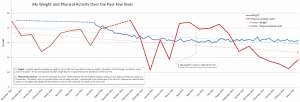I was overweight as a kid, and like a lot of overweight kids I was not a fan of exercise and the opportunities it presented to put my shortcomings on display (I’m looking at you, gym class). As an adult, however, I have come to love it. I particularly love the alone time granted by a long bike ride or an afternoon hiking. I can even find that solitude in a morning jog or a quick stop at the gym. I love the way it burns off my anxious energy, and how I can count on it to help me sleep better. I must admit, though, that I struggled with whether or not to use the past-tense (loved) in those last few sentences. My daughter (our first) was born last spring. She is the most wonderful person I know, but caring for her takes up an astonishing amount of time and energy, which has led to a significant decrease in the amount of time I spend exercising. She does not directly prevent me from taking long bike rides or going on afternoon hikes, but it’s way harder to fit them in. I actually jogged this morning, but it was the first time this week. It was half as long as the ones I was taking a year ago, yet it made my lungs burn significantly more. I could have gone further, but I wanted to get home to eat breakfast with my daughter and her mom before we all headed to work.
An infographic from the Atlantic recently passed through my Facebook feed with the attention-grabbing heading “Why Exercise Doesn’t Help You Lose Weight”. It has five sections, each citing a different piece of research. In summary:
- From 1988 to 2006 Americans exercised more, but the prevalence of obesity increased.
- Countries that are more sedentary do not necessarily have a higher prevalence of obesity.
- The amount people move may not correlate directly with the amount of calories they burn.
- Peoples’ metabolisms may adapt to sustained increases in physical activity.
- People tend to overestimate the energy they burn during exercise, which may lead to overeating.
I have not read the cited articles. Even if I had, I do not have the knowledge and technical skills to determine the relative accuracy of the various findings. I do, however, feel that my personal experience with the relationship between exercise and weight loss is relevant.
I was overweight for the vast majority of my adult life. I lost significant weight a couple of times, but would always gain it back. I began a new effort to lose weight in July of 2014, dipped in to the ‘normal’ BMI range around November of that year, and have floated along just south of that threshold ever since. It’s my longest period of sustained weight loss. I still don’t quite believe it. The strategies I used are here. I knew before I began the effort that, in my case, exercise was not the most critical component. If it was, I would have lost the weight years ago. Here’s a chart that illustrates how my weight and physical activity have correlated over the past few years:
 As the amount of exercise I have been getting decreases, so does my weight. If I had the data to show you the decade prior it would further underscore the fact that that, historically, the amount of exercise I get has had little impact on how much I weigh.
As the amount of exercise I have been getting decreases, so does my weight. If I had the data to show you the decade prior it would further underscore the fact that that, historically, the amount of exercise I get has had little impact on how much I weigh.
This evidence does not make me relieved. I am not ecstatic that I don’t have to waste my time at the gym anymore. I rely on exercise to settle me and clear my head. Exercising also makes me feel strong and physically refreshed, and this feeling was just as noticeable when I was 30 pounds heavier. My point: I do not exercise to lose weight, but it has other effects on my life that are at as least important. I do not know if getting more exercise will help you lose weight, but if that’s the only reason you are doing it, you may be missing the point.
If you are interested in evidence for the health benefits of exercise beyond weight loss that is less anecdotal, this video is a great place to start.

